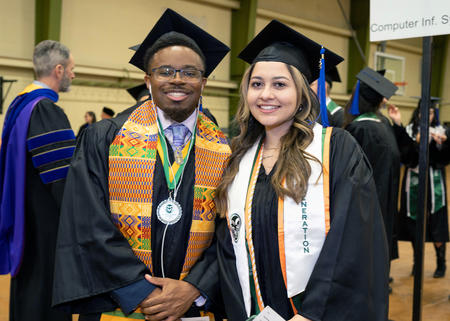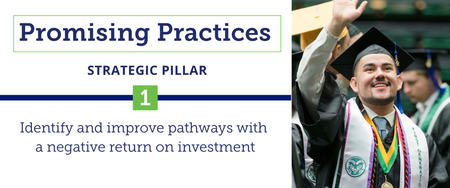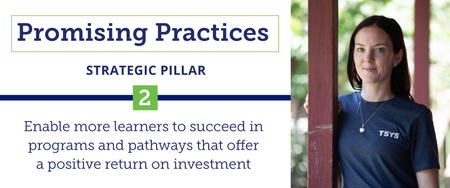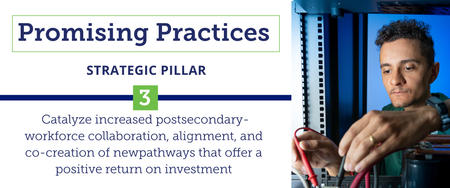2023 Strategic Plan
INSTITUTION HIGHLIGHTS for Colorado’s Promising Practices
- In 2020, Pikes Peak Community College awarded more than 10,500 credits for prior learning for individuals who had served in the military, with most credits applying to management, computer information systems, culinary arts, and criminal justice.
- Since the fall of 2019, Arapahoe Community College’s Open Educational Resources initiative has saved more than 15,000 students nearly $2 million in textbook expenses by replacing high-cost print textbooks with OER resources including full courses, course materials, modules, textbooks, streaming videos, tests, software, and other materials to support widespread access to knowledge.
- Through scholarships and support services, the Colorado Opportunity Scholarship Initiative (COSI) has increased affordability and accessibility for learners across the state, with more than half of those served to date being learners of color. Learners supported by COSI have completed more than 16,000 postsecondary credentials.
- Colorado State University’s academic success coordinators and advisors have increased on-time degree completion by more than 50% in four years by using data analytics, proactive outreach, and other proven approaches.
- Colorado GEAR UP has increased FAFSA completion rates, high school graduation rates, and postsecondary enrollment rates among low-income high school learners. Learners in 15 high schools across the state are benefiting from one-on-one mentoring, a college preparatory curriculum including financial literacy and financial aid, advising, and wraparound services.
- The Quad Innovation Partnership, an initiative of Colorado College, University of Colorado-Colorado Springs, Air Force Academy, and Pikes Peak Community College pulls students together from diverse campus backgrounds to collectively work on Colorado Springs area issues, from energy use to smart city mapping to suicide prevention. A 2018 survey showed that 94% of Quad students feel more or much more ready for their professional lives after college, regardless of which participating school they attend.
- Red Rocks Community College’s STEM Education Leadership Initiative for Students of Colorado is expanding opportunities for diverse learners to access careers in high-tech and STEM careers.
- Colorado State University—through its Academic Advancement Center—has increased four-year graduation rates among students of color by using a learner-centered, strength-based approach to supporting learners with their academic, personal, and career goals.
- The University of Northern Colorado supports first-generation students, including tutoring and personalized coaching, resulting in its highest retention rates in 2022 for first-generation students in over a decade.
- Colorado institutions are demonstrating a commitment to addressing student food insecurity with the Hunger Free Campus initiative.
- Colorado State University’s on-campus food pantry serves an average of 400 students, staff, and faculty per week, alleviating food insecurity and helping with housing and utilities support, applying for SNAP benefits, and other basic needs.
- Pueblo Community College hosts several mobile food pantry events during which rolling carts are packed with food and hygiene items and are taken to high-traffic student areas. These events also incorporate clothing, housewares, and coat distribution.
- Mental health is one of the top concerns in a learner’s chances of completing their education pathway. Ten Colorado institutions (as of 2022) have earned the Healthy Minds designation, given when a campus implements certain programs and initiatives focused on mental health issues.
- Western Colorado University held a three-month campaign to destigmatize mental health by guiding learners in self-reflection, coalition building, and community action.
- Metropolitan State University of Denver’s partnership with SpringHill Suites by Marriott offers learners the opportunity to gain hospitality skills and expand their professional network.
- Metropolitan State University of Denver’s Earn and Learn Program supports learners from diverse backgrounds in accessing internships and other experiential learning opportunities.
- Front Range Community College partners with local employers to offer apprenticeships in high-demand fields, including health care, manufacturing, and tree care.
- Colorado State University Global aligns its degree programs with industry certifications and standards, and all faculty are required to have recent industry experience to ensure students learn the most up-to-date skills employers are seeking.
- At Regis University’s Center for Counseling and Family Therapy, learners complete training in health fields by providing low- to no-cost services to a low-income community and virtually across the state. The Center ramped up from providing 60 hours of behavioral health services to 600 hours per month. Students get hands-on training, and the community gets low- to no-cost state-of-the-art mental health services.
- In partnership with the Education Design Lab, Colorado Community College System is building five “micro-pathways” in health care and energy that combine industry-recognized credentials and non-credit and credit-bearing courses to route Coloradan learners to high-skill, high-wage, in-demand jobs.



